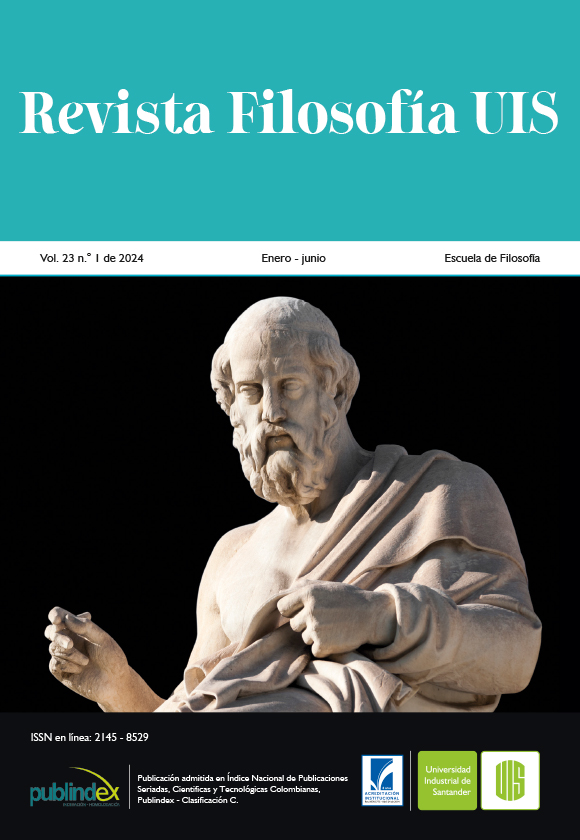Published 2024-01-02
Keywords
- Conceptual Jurisprudence,
- methodology,
- modest and immodest conceptual analysis,
- the nature of law
How to Cite
Copyright (c) 2024 Revista Filosofía UIS

This work is licensed under a Creative Commons Attribution 4.0 International License.
Abstract
This essay argues that immodest conceptual analysis is epistemically infeasible for beings like us because we immodest claims about the nature of a kind cannot be justified by means that are either a priori or a posteriori. Immodest conceptual analysis is epistemically infeasible, then, because we have no reliable way to identify and justify immodest claims about the nature of a kind. The essay ends with an evaluation of Scott Shapiro’s and Mark Greenberg’s theories of law from the standpoint of a modest approach – i.e. from the standpoint of what our conceptual practices entail with respect to the nature of law.
Downloads
References
- Béjoint, H. (2000). Modern Lexicography: an Introduction. Oxford University Press.
- Bergenholtz, H. y Gouws Rufus, H. (2012). What is Lexicography? Lexikos, 22(1), 31-42.
- BonJour, L. (1988). The Structure of Empirical Knowledge. Harvard University Press.
- Chalmers, D. (2020). What is Conceptual Engineering and What Should it Be? Inquiry: An Interdisciplinary Journal of Philosophy, 1-17.
- Descartes, R. (1977). Meditaciones metafísicas. Con objeciones y respuestas (V. Peña, trad.). Alfaguara.
- Dworkin, R. (1977). Taking Rights Seriously. Harvard University Press.
- Fitting, M. (2015). Intensional Logic. En E. Zalta (ed.), Stanford Encyclopedia of Philosophy. Stanford University. https://plato.stanford.edu/entries/logic-intensional/
- Frege, G. (1892). Über Sinn und Bedutung. Zeitschrift für Philosophie und philosophische Kritik, 100, 25-50.
- Frege, G. (1997). On Sense and Reference (M. Beaney, trad.). En M. Beaney (Ed.), The Frege Reader. Blackwell.
- Greenberg, M. (2008). How Facts Make Law. En S. Hershovitz (Ed.). Exploring Law’s Empire: The Jurisprudence of Ronald Dworkin (pp. 225-264). Oxford University Press.
- Greenberg, M. (2014). The Moral Impact Theory of Law. Yale Law Journal, 123(5), 1288-1342.
- Hart, H. (1998). El concepto de derecho (G. Carrió, trad.). Abeledo Perrot.
- Himma, K. (2023). Replacement naturalism and the limits of experimental jurisprudence. Jurisprudence, 14(3), 348-373.
- Hume, D. (1975). An Enquiry Concerning Human Understanding. En L.A. Selby-Bigge (Ed.). Clarendon Press.
- Jackson, F. (1998). From Metaphysics to Ethics: A Defence of Conceptual Analysis. Oxford University Press.
- Klein, P. (2005). Infinitism Is the Solution to the Regress Problem. En M. Steup y E. Sosa, E (eds.). Contemporary Debates in Epistemology. Blackwell Publishing.
- Kripke, S. (1972). Naming and Necessity. Harvard University Press.
- Leiter, B. (2007). Naturalizing Jurisprudence. Oxford University Press.
- Merriam-Webster. (2024). Dictionary. Merriam-Webster Inc. https://www.merriam-webster.com/
- Morris, W. E. y Brown, C. R. (2023). David Hume. En E. Zalta (Ed.). Stanford Encyclopedia of Philosophy. Stanford University. https://plato.stanford.edu/entries/hume/
- Oxford English Dictionary. (2015), 7th Ed. Oxford University Press.
- Quine, W. (1951). Two Dogmas of Empiricism. Philosophical Review, 60(1), 20-43.
- Raz, J. (2009). Can There Be a Theory of Law? En J. Raz, Between Authority and Interpretation. Oxford University Press.
- Russell, B. (2020). A priori Justification and Knowledge. En E. Zalta (ed.). Stanford Encyclopedia of Philosophy. Stanford University. https://plato.stanford.edu/entries/apriori/.
- Shapiro, S. (2011). Legality. Harvard University Press.
